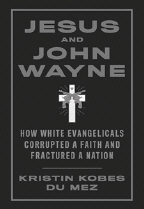Jesus And John Wayne: How White Evangelicals Corrupted A Faith And Fractured A Nation -- By: Anne Kennedy
Journal: Eikon
Volume: EIKON 03:1 (Spring 2021)
Article: Jesus And John Wayne: How White Evangelicals Corrupted A Faith And Fractured A Nation
Author: Anne Kennedy
Eikon 3.1 (Spring 2021) p. 131
Jesus And John Wayne: How White Evangelicals Corrupted A Faith And Fractured A Nation
REVIEWED BY
Anne Kennedy, MDiv, is the author of Nailed It: 365 Readings for Angry or Worn-Out People (SquareHalo Books, revised 2020). She blogs about current events and theological trends at Preventing Grace on Patheos.com.

Kristin Kobes Du Mez. Jesus and John Wayne: How White Evangelicals Corrupted a Faith and Fractured a Nation. New York: Liveright, 2020.
“When Rachel Held Evans and Jen Hatmaker ran afoul of conservative orthodoxies related to sexuality and gender…” (9) I stopped and read the line aloud, those two names — Rachel Held Evans and Jen Hatmaker — leaping off the page. Was Kristin Kobes Du Mez, in her bestselling Jesus and John Wayne: How White Evangeclicals Corrupted a Faith and Fractured a Nation, going to make me unhappily relive the controversies of the last fifty years that rent not only my own denomination, but the whole country? Or, would she be able to effectively untangle the theological, political, and cultural mess that has made life in the church so complicated? I had high hopes, especially as I had just wasted fifteen precious minutes of my too busy day watching Jen Hatmaker unbox the Spring FabFitFun Box,
Eikon 3.1 (Spring 2021) p. 132
that subscription cornucopia of wellness, beauty, and personal pampering products. After the unboxing video, I scrolled a little further and listened to Hatmaker — tired but cheerful — launch her latest book, Simple and Free, a treatise on how to deal with the material excesses of life.
“The products Christians consume shape the faith they inhabit,” writes Du Mez. I couldn’t agree more. It is why, I think, Jesus and John Wayne is so popular at this particular moment. In it Du Mez aggressively articulates the ascendant theological assumptions of the day. In it she apprehends the contours of American religiosity. And in it, she sets forth the new, progressive theological guardrails of moral and philosophical acceptability. If you want to know what to think about the American religious landscape, order in a FabFitFun box, sign up for the online book club, and if you are very lucky, your favorite Christian celebrity might be able to join you on Zoom.
Eikon 3.1 (Spring 2021) p. 133
Or course, if you have run across Jesus and John Wayne, you will see that I left off Du Mez’s punchline. Here is her point: “Today, what it means to be a ‘conservative evangelical’ is as much about culture as it is about theology. This is readily apparent in...
Click here to subscribe
